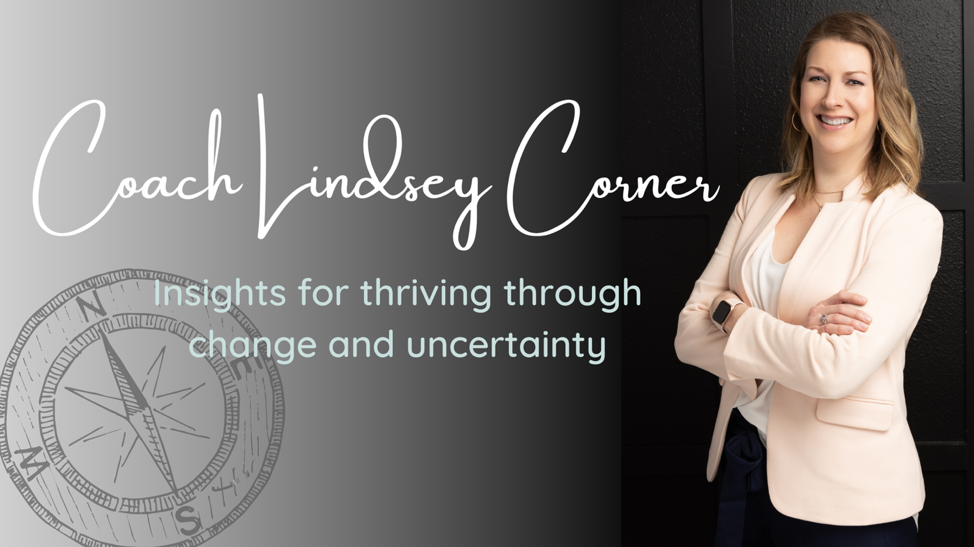
Inaugural Edition of Coach Lindsey Corner
Welcome to the inaugural edition of Coach Lindsey Corner! The goal is to tackle some matters folks might find tricky when faced with professional change and uncertainty. And let’s be honest. Usually, the only thing certain about our professional lives IS uncertainty. Today we’re talking about career transition, but truthfully, these considerations might apply to any changing circumstances you might face. Have you had a change in leadership you’re trying to adjust to? Has your role evolved with the changing economic conditions? Do you have personal challenges you’re trying to balance? We think you’ll find the following information useful, no matter the specifics of your situation.
Making a big career change is a bold step that can be both exhilarating and nerve-wracking. It's an opportunity for personal growth, pursuing passions, and embracing new challenges. However, amidst this transition's excitement (and anxiety!), it's crucial not to overlook one essential aspect: understanding your audience. Whether you're talking to potential employers, networking contacts, or loved ones, empathizing with their perspectives can make all the difference in how your decisions are received.
Recognizing Diverse Perspectives
When undergoing a career change, becoming fixated on our goals and aspirations is easy. It’s probably all we can think and talk about early on in the process. However, it's essential to remember that you are likely bringing others along on your journey. Every individual involved holds a unique perspective. Acknowledging these diverse viewpoints can help you tailor your message and approach accordingly. Consider the following groups:
Employers and Hiring Managers: These individuals seek specific skills, experiences, and qualities in candidates. Tailor your narrative to highlight how your past experiences and expertise can seamlessly transfer to your new career path.
Networking Contacts: Be mindful that they may not be familiar with your new industry or role. Communicate your motivations and the research you've conducted to ensure they understand your thought process.
Family and Friends: Loved ones might be concerned about your well-being and stability during this transition. Assure them that you've thoroughly considered the implications and have a plan to mitigate potential risks.
Storytelling with Authenticity
Storytelling is a powerful tool when navigating a career change. However, the key lies in sharing your journey with authenticity and transparency. People are more likely to connect with your narrative when they see the genuine passion behind your decision. Avoid jargon or technical language that might alienate those unfamiliar with your new field. Instead, focus on the broader life lessons, skills gained, and personal growth that have led you to this new path.
Active Listening and Empathy
Remember that communication is a two-way street when conversing about your career change. Don't just share your story; actively listen to the concerns and questions of your audience. Empathize with their perspectives and respond thoughtfully. This empathetic approach fosters trust and creates a more open environment for meaningful conversations.
Addressing Concerns and Misconceptions
It's natural for people to have concerns and misconceptions when confronted with a big career change. Anticipate these potential objections and prepare well-reasoned responses to address them. Show that you've considered potential challenges and have concrete plans to overcome them. Demonstrating preparedness can alleviate worries and instill confidence in your decision.
Leveraging Networking and Mentoring
Surrounding yourself with individuals who have experienced similar career shifts can be invaluable. Seek networking events or mentors who can offer guidance and share their stories of successful transitions. Learning from those who have walked a similar path can equip you with valuable insights and strategies.
Understanding your audience during a significant career change is essential to avoid appearing tone-deaf and disconnected from the concerns of others. By recognizing diverse perspectives, crafting authentic narratives, practicing empathy, and addressing fears proactively, you can create a more receptive environment for your career transition. Remember that open communication, active listening, and being receptive to feedback are the keys to a successful and supported journey into your new career path. Embrace your decision passionately and confidently; your audience will likely follow suit.
Read more at CoachLindsey.IO or book with her now.